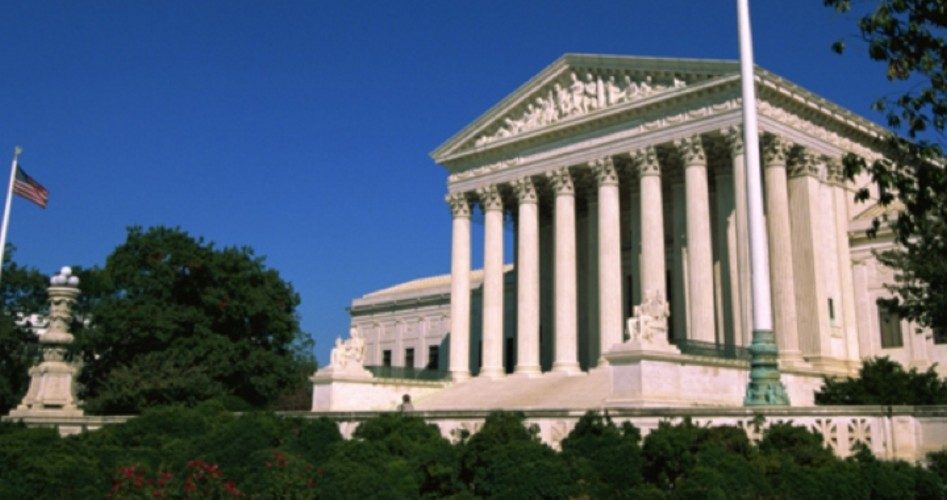
The Supreme Court has agreed to hear a case that could place limitations on prayer at government meetings in cities, towns, and municipalities across the nation. The case involves the tradition in the predominantly Christian community of Greece, New York, of having pastors and lay people from local churches open the monthly government meetings with prayer. In 2007, two local women who didn’t like the fact that the prayers were virtually all offered by Christians complained, prompting community officials to invite a Wiccan priest, a Baha’i representative, and a Jewish man to offer the prayers. When it was found that eight of the next 12 meetings featured Christian prayers, the atheist group Americans United for Separation of Church and State gallantly stepped in and sued the town on behalf of the women.
In 2008, a lower court ruled in favor of the community, finding that the town fathers had not intentionally excluded non-Christian prayers. But Americans United appealed, and in 2012, a three-judge panel of the U.S. Court of Appeals for the 2nd Circuit reversed the lower court decision, ruling that the town officials had somehow violated the First Amendment’s supposed separation of church and state clause by unfairly favoring Christian prayers. That decision set up an appointment with the Supreme Court, which agreed to hear the case in full.
“A town council meeting isn’t a church service, and it shouldn’t seem like one,” intoned Barry Lynn, a spokesman for Americans United. “Government can’t serve everyone in the community when it endorses one faith over others. That sends the clear message that some are second-class citizens based on what they believe about religion.”
But Joel Oster of Alliance Defending Freedom (ADF), which is representing the town of Greece in the case, said that the appeals court ruling forces the city to become a prayer monitor in its meetings, and turns the reverent tradition of prayer into a government-supervised affirmative action program. “Since this nation’s founding, public meetings have been opened with prayers offered according to the conscience of the speaker,” noted Oster. “There is no legal reason why a town cannot engage in this practice today with people from within its own community. The district court rightly affirmed the constitutionality of the town’s policy.” He added that secular groups with a grudge against Christianity “cannot be allowed to force local governments to engage in strange hoops and hurdles that effectively eliminate prayers by making them too difficult to take place.”
Oster pointed out that the U.S. Constitution “has never required any local government to engage in such gymnastics to have prayer, as is clearly seen by the prayers of America’s Founding Fathers. Prayer-givers have a right protected by the First Amendment to engage in speech that reflects their own conscience and religion during such prayers. That does not make the prayers an endorsement by the town itself of any particular religion.”
ADF attorney Brett Harvey told National Review that the opportunity to pray at Greece town meetings “has been extended to people of all faiths, including atheists. The court of appeals punished the town because they didn’t bus in people from out of town to pray, but the town should not be forced to handpick out-of-towners to lead the Greeks in prayers. The citizens of the Town of Greece are capable of speaking for themselves.”
In taking the case to the Supreme Court, the ADF has been joined by attorney Thomas Hungar, whom Ken Klukowski of the Family Research Council called “one of the most accomplished Supreme Court litigators in the nation. “We appreciate the Supreme Court’s decision to review the important question presented by this case,” said Hungar. “The practice of legislative prayer is firmly embedded in the history and traditions of this nation. We hope the court will reaffirm the settled understanding that such prayers, offered without improper motive and in accordance with the conscience of the prayer-giver, are constitutional.”
Klukowski noted the relative drought of High Court cases favoring religious liberty over the past decades. “The last time Americans had a victory for religious liberty purely on Establishment Clause grounds was 2005, when the Supreme Court upheld a Texas Ten Commandments display in Van Orden v. Perry,” wrote Klukowski in a column on Breitbart.com. “But that was a fractured 5-4 decision with no majority opinion, so no enduring rule of law was established as precedent in that case.”
He added that it might be necessary to go back as far as 1983 “to the Supreme Court’s first vindication of legislative prayer in Marsh v. Chambers to find a majority win [for religious freedom]. The few wins over the past 30 years for people of faith have been due to free speech or the free exercise of religion — rather than the Establishment Clause — or because the case was dismissed on procedural grounds.” He said that “since Justice Samuel Alito took the seat of Justice Sandra Day O’Connor, scholars have wondered if the Court had become friendlier to people of faith, especially Christians. Now they will find out.”



